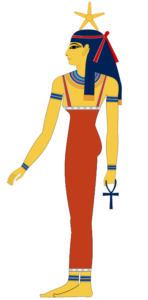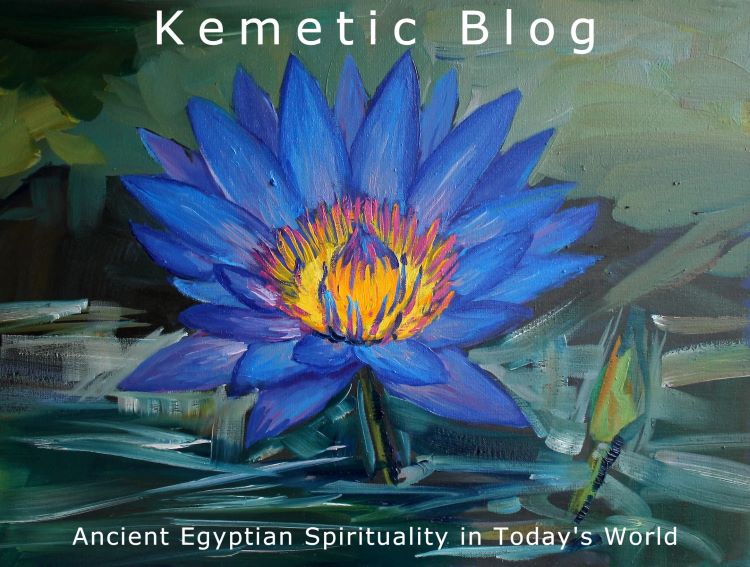Wep Ronpet, the ancient Egyptian New Year, falls on a variable day each year from late July to early August. It occurs when the star Sirius (known as spdt or Sopdet ) first rises in Cairo and once coincided with the annual flooding of the Nile river. This celestial event is called the heliacal rising of Sirius and continues to be observed today as the Kemetic New Year.
While Wep Ronpet is the main festival celebrated by Kemetic practitioners worldwide each year, not everyone celebrates this holiday at the same time. There are many reasons for this and to simplify, I would say reconstructing an ancient religion is not as easy as 1-2-3. Some Kemetic practitioners and Kemetic temples (including the Kemetic Orthodoxy based in the USA) celebrate Wep Ronpet when Sirius rises in their local area instead of Egypt. Whenever you choose to celebrate Wep Ronpet — assuming the reader is a Kemetic — each practitioner should do what feels right for them.
Personally, I can see the logic behind local observances. When we celebrate mainstream New Year, we do so when the clock strikes midnight in our local timezone, not in the timezone in which modern New Year celebrations originated. I’m not even sure where that would be — Rome, perhaps?
With that said, my own preference is to celebrate Wep Ronpet in synch with Egypt. Having lived in Australia for many years, I’m accustomed to making adjustments to accomodate the rest of the world. Mainstream holidays like Christmas take place in summer here and September is in the spring. Besides, in the Southern Celestial Hemisphere, Sirius (located to the lower left of Orion’s belt) is a star I’m pretty sure we can see year around. To my knowledge, there’s no big annual debut of Sirius or Sopdet in the Southern hemisphere. Yet another reason I’ve chosen go with Cairo.
At any rate, since Egypt is the motherland of the religion that chose me, and since my work is very energy-based, I prefer to connect and align with the energy of Wep Ronpet in Egypt. But that’s just a personal preference! It may not seem like Kemetic New Year to you, unless you see Sopdet rising in the pre-dawn sky and I totally get that. Dua, Sopdet!
Again, each Kemetic practitioner should do what feels right for them. To make your decision easier, check out In-the-sky.org to determine when the heliacal rising of Sirius will take place either in Cairo or in your local area. See the 2020 article, A Kemetic calendar proposal by wolfboy180, who states:
“You can use the site above to figure out the date of Wep Ronpet by punching in Cairo as the location, setting the Object Type to “any” and the Object to Sirius. (Just type it in, it’ll work.)
There’s a column on the right (you might need to scroll if you’re on your phone) titled “Observable (hover mouse)”. The first day after it stops saying “Not observable” is Wep Ronpet.”

The Goddess Sopdet, the ancient Egyptian personification of the star Sirius. Image via Jeff Dahl/ Wikimedia Commons.
A quick calculation for the date of Wep Ronpet in Cairo for upcoming years (note that in the coming decades, the date will drift to Aug 9 and 10 which is normal):
2021 – Aug 8
2022 – Aug 8
2023 – Aug 8
2024 – Aug 7
2025 – Aug 8
2026 – Aug 8
I don’t think the gods are going to slight anyone for celebrating Wep Ronpet on varying days.
In fact, based on my Subjective Mystical Experiences and Encounters (SMEEs), the gods are over the moon we’re even celebrating Wep Ronpet at all. Modernity’s interest in the ancient world is a great honour for the ancients and is mirrored by their interest in us. This is something I first learned about from my work with Tutankhamun (then later with Seti I, Queen Tiye, Nefertiti and others). If I may diverge on this topic for a while (and put to rest our obsession with precisely when Wep Ronpet is supposed to be) :
The end of ancient Egyptian civilisation and the old ways were an incalculable loss for the netjeru, the blessed dead and the spiritual guardians. Imagine for a moment what that must have been like. The fact that people care at all today is massively invigorating for them. What I’ve come to understand from my work with the netjeru, was their experience of loss was profoundly humbling. After the passing of the ancient world, the netjeru continued to work with humanity but they became somewhat silent partners, working behind the scenes to make the world safer, better and more orderly. The netjeru continued to uphold Ma’at and encouraged humanity to do the same in secret ways. They were gods underground as it were, immense beings with no ego in most cases (save for a select few, who I still need to write about one day).
When the netjeru came into my life, as I’ve relayed before, they did not herald their identities to me right away, not until I expressed an interest in them and gratitude for their intervention; not until I began to worship them in an intuitive, prototypical fashion. I’m a little bit more informed today but part of my barebones it’s you, me and the stars approach still persists in our relationship because it works. It may be different for you and if so, that’s totally fine. I, for one, encourage freedom of expression in Kemeticism because this is what the netjeru are showing me. They are my teachers. At the same time, it’s understood that Kemeticism is going to mean different things to different people. They might be showing you something else because we can each see things from another angle.
Now that readers are familiar with my open stance on when to celebrate Wep Ronpet, it should be no surprise that my advice on how to celebrate is just as open.
I think it’s good to be informed by tradition but at the same time, don’t be afraid to start your own. For Wep Ronpet this year, I’m simply going to throw a party except in this case, most of my guests happen to be non-physical beings. I’m going to make them a home-cooked dinner, pour them some wine and play some good music because that’s what you do when you have friends over. In the future, I resolve to learn more. I’ll impress them with speaking ancient Egyptian, reconstruct rituals more accurately and maybe even compound my own kyphi incense in that copper cauldron I saw on Ebay. But I know that what I’m doing right now is fine because they’re here and they’re sticking around.
For Wep Ronpet then, I’m celebrating the netjeru and I’m thanking them for sticking around, for staying close to Earth and close to humanity, even after the loss of ancient Egypt and the old ways that persisted for thousands of years. I hope that we, as Kemetics, help make it worthwhile for them. I thank them for being patient with our petty squabbling and our disagreements that Kemetics and the rest of humanity are unfortunately known for.
What I am being shown is, the way in which the netjeru are coming into our lives today — through dreams, visions, feeling drawn to certain things — is exactly how they came into the lives of ancient peoples. This is how ancient Egyptian religion, the civilisation, how everything started, through a relationship with the divine that was very primordial in the beginning and which later grew into something truly magnificent. Maybe that can happen again, if we can stop fighting and destroying ourselves.
Em hotep! Have a happy Wep Ronpet and thank you, as always, for reading Kemetic Blog.
𓆸
© Scott Rose / Kemetic Blog – All Rights Reserved.


3 Comments
An Unexpected Execration Ritual
August 6, 2021 at 8:31 am[…] practitioners today reconstruct these rituals by smashing terra cotta pots during festivals such as Wep Ronpet. Personally, I do not take any magical action lightly. I’ve cast spells in the past that […]
Gearing up for Wep Ronpet, The ancient Egyptian New Year — Part Two: Honouring Hapi and the Spirit of the Inundation
July 22, 2022 at 11:32 am[…] and significance of the holiday to both ancient and modern people alike. In my post on Wep Ronpet last year I did my best to provide a comprehensive overview as to when Wep Ronpet will occur and how to […]
Honouring Mother Mountain for Wep Ronpet: The Ancient Egyptian New Year
July 19, 2023 at 11:48 am[…] year’s focus was on the god, Hapi and the inundation and the year before on the heliacal rising of the Star, Sopdet. Both these links contain approximate dates for Wep Ronpet and ideas on how to celebrate, […]